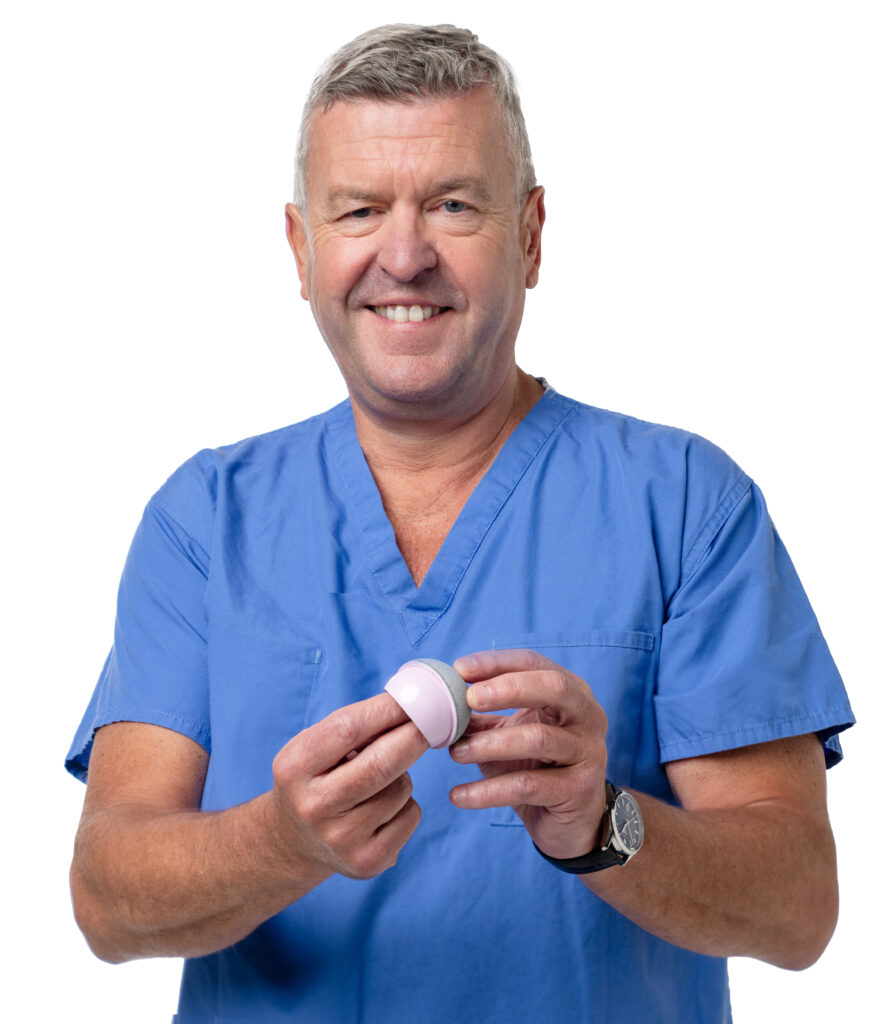A new ceramic hip resurfacing implant that could be more durable than metal versions has been approved following a clinical study involving experts at Newcastle Hospitals.
Hip resurfacing involves shaping the femoral head (ball) of the joint to remove worn cartilage and replacing it with a metal spherical cap. Whilst effective for most, in some cases, wear and tear of the implant can cause particles to fall away and irritate tissue around the hip.
Ceramic implants are less likely to wear over time and are generally well-tolerated by the body. They can also be considered for patients where metal implants are not recommended, including women and patients who have smaller hips.
Surgeons have been successfully using ceramic implants in total hip replacements for some time, however evidence on its use in hip resurfacing has been limited to date.
Informing treatment options
To inform the best treatment options for patients in the future, the ReCerf® total hip resurfacing study set out to evaluate the performance of a ceramic implant manufactured by medical devices company, MatOrtho.
In Newcastle, the study started in 2020 and involved 41 patients who were under the care of orthopaedics at the Freeman Hospital, all of whom received the ReCerf® implant.
Of these participants, 29 also had data collected through radiosterometric analysis (RSA), a procedure which involves inserting a small number of tiny beads into the bone surrounding the implant.
Over time, these beads integrate into the bone and can be detected on an X-ray after surgery. Specific software is then used to map any micro-movement of the implant between set time points.
The study was led at the Freeman Hospital by consultant orthopaedic surgeon, Mr Jim Holland, and the trust’s orthopaedic research team.
The Freeman recruited the most patients in the country to the study and was the first in the UK to perform hip resurfacing using the ReCerf® implant.

Mr Holland said:
“Hip resurfacing can be particularly beneficial for some patients, such as those who are younger and more active. Unlike a total hip replacement, hip resurfacing preserves more of the natural bone and is more straightforward to repeat if needed.
“I am delighted that the Freeman is one of a few selected hospitals who can offer suitable patients hip resurfacing using the ReCerf® implant.
“Getting to this stage wouldn’t have been possible without patients who took part in this study. My thanks also go to our orthopaedic research team who worked hard to deliver the study to patients.”
ReCerf® has now received its CE mark (Conformité Européenne), meaning it has met all relevant requirements needed to be sold in the European Economic Area.
To date, the ReCerf implant is working well for patients who were part of the study, however more data is needed to develop robust clinical evidence. Results of the RSA study are expected to be shared in 2026.
Sian’s story
58-year-old Sian Oakley from Northumberland was accustomed to scaling mountains in the Lake District and climbed competitively for Great Britain throughout her 20s and 30s.

Sian had experienced hip pain for many years but was told it was likely muscular, however by the time she reached her 40s, the pain became so debilitating that she struggled to walk up the stairs.
Scans showed that the surface of Sian’s hip joint had worn down, but due to her age and good health, she was able to undergo hip resurfacing and avoid a total hip replacement.
Sian made a good recovery and even went on to climb Mount Blanc, Europe’s highest mountain. Unfortunately, two years later, she started to experience similar symptoms in her left hip and returned to see Mr Holland.
Mr Holland told Sian she might be suitable for a clinical trial which was evaluating the performance of the ceramic ReCerf implant.
Sian, who works part-time as a teacher, said:
“I’ve always been an active person, so it was a huge blow when pain in my hip became so bad that simple day-to-day tasks were difficult.
“For the best part of ten years, I struggled on with hip pain, so when my left hip started hurting, I was determined to not let it get as bad.
“After my first operation, I was better than I had been in years, so when Mr Holland mentioned the ceramic hip resurfacing implant that was being trialled, I was happy to take part.”
In Spring 2024, Sian had surgery using the ReCerf implant. She is now back to playing golf regularly and is enjoying life without pain.
